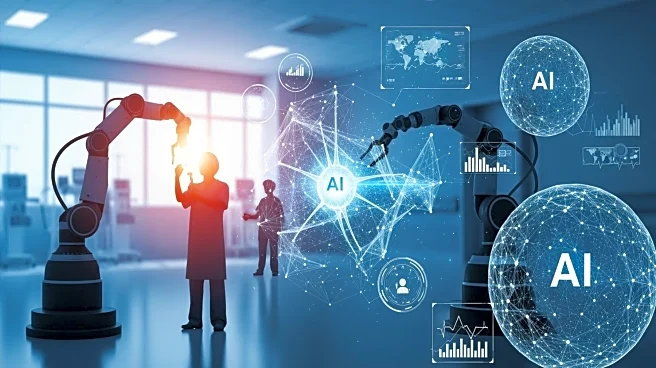What's Happening?
The healthcare industry is examining the integration of AI technologies to enhance human roles rather than replace them. This approach, referred to as the 'mech-suit' strategy, involves using AI tools
to extend the capabilities of healthcare professionals by providing them with rich context and insights to support decision-making. This contrasts with the 'robot' approach, which seeks to automate tasks entirely, often at the expense of human judgment and emotional connection. The article highlights the importance of using AI to augment human abilities, particularly in scenarios where human touch is invaluable. The strategy aims to leverage AI for tasks that are prohibitively expensive or labor-intensive at scale, such as data ingestion and quality control, while maintaining human involvement in areas requiring nuanced judgment.
Why It's Important?
The integration of AI in healthcare is significant as it promises to transform the industry by enhancing efficiency and expanding the realm of possibilities. By adopting the 'mech-suit' strategy, healthcare leaders can ensure that AI complements human expertise, allowing professionals to focus on tasks that require human judgment and emotional connection. This approach can lead to improved patient care and operational efficiency, as AI handles repetitive tasks and provides valuable insights. The strategy also addresses the challenge of resource scarcity in healthcare, enabling professionals to work at the top of their licensure. The broader impact includes potential cost savings and increased access to healthcare services, particularly in underserved areas.
What's Next?
Healthcare leaders are expected to continue exploring AI applications that balance automation with human involvement. The focus will be on identifying areas where AI can unlock new possibilities, automate expensive tasks, and accelerate innovation. As AI technologies evolve, healthcare organizations will need to develop strategies that leverage AI's strengths while recognizing its limitations. This may involve investing in AI tools that support human decision-making and enhance patient interactions. The ongoing development of AI in healthcare will likely lead to new models of care delivery and operational efficiencies, with potential implications for policy and regulatory frameworks.
Beyond the Headlines
The ethical implications of AI integration in healthcare are an important consideration. Ensuring that AI systems align with societal values and respect human rights is crucial. The 'mech-suit' strategy emphasizes the importance of maintaining human involvement in healthcare, which can help address concerns about the dehumanization of care. Additionally, the strategy highlights the need for transparency and accountability in AI deployment, as well as the importance of building trusted relationships and operational infrastructure to support AI initiatives. Long-term shifts may include changes in workforce dynamics and the development of new roles that combine AI expertise with clinical skills.









